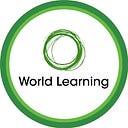World Learning is working with Special Olympics to expand leadership summit with digital programs
By Abby Henson
World Learning will support the digital programming for the 2025 Special Olympics Global Youth Leadership Summit.
The summit, which takes place in Italy in March, will bring together youth from around the world to develop skills to be changemakers in their communities. In addition, Special Olympics wants summit attendees to engage and network with each other before and after the event. To achieve this, World Learning is designing curricula for virtual exchange programs that will launch in January and extend after the summit’s March dates.
“World Learning is thrilled to work with Special Olympics on this unique project,” World Learning CEO Carol Jenkins said. “Virtual exchanges allow organizations to enhance programming by providing an effective way to teach skills and deliver resources ahead of or following in-person exchanges. The inclusive program design optimizes participant engagement and ensures they are fully prepared when they meet in person — as well as allows a platform to expand upon what they have learned after.”
The pre-summit exchange will be designed for a minimum of 50 youth. The two-week online program will consist of asynchronous activities, a full-group workshop with breakout sessions, and small-group dialogue sessions — all designed to promote cross-cultural awareness and understanding of global competencies. Customized training modules may also be developed to acknowledge the strengths or challenges that participants with or without intellectual disabilities bring to the group.
“Virtual exchanges allow organizations to enhance programming by providing an effective way to teach skills and deliver resources ahead of or following in-person exchanges.” World Learning CEO Carol Jenkins
The post-summit virtual exchange will be a full group synchronous session, allowing the participants to reflect on their in-person summit experience and create ways to expand their networks in their home communities.
World Learning has also been charged with developing the curriculum for a two-week-long virtual adult mentor training for 25 participants. Adult mentors will facilitate the participants’ progress on program activities, help build their capacities and skill sets, and act as a cultural bridge. Overall, they support the development of group cohesion and community among participants.
“The goal of the training is to provide adult mentors with a clear understanding of their pivotal role in working with and nurturing the potential of youth within the Special Olympics community,” said Special Olympics Chief of Global Youth and Education Jackie Jodl. “By fostering an environment of support, encouragement, and inclusion, mentors play a crucial part in empowering youth to overcome challenges, build self-confidence, and develop the skills needed to thrive both within the Special Olympics and beyond.”
In addition to developing three virtual program curriculums, World Learning will train Special Olympics staff on how to deliver all three sessions. These trainings will include tailored reference materials to help the trainees in the future.
“World Learning has extensive experience designing contextualized programs that address partner needs,” said World Learning Vice President of Global Programs Melissa Oppenheimer. “Our experience in building dynamic, scalable training of trainers programs is equally deep. We prioritize helping our partners increase their teams’ capacity to achieve sustainable results.”
World Learning began developing the various curriculums in July and plans to finalize them — and train Special Olympics staff — before December. It will also conduct a post-event survey to make recommendations that will help shape the next Global Youth Leadership Summit in 2027.
“Our agreement with Special Olympics creatively combines resources and expertise to further our mutually aligned efforts to help youth gain new skills and networks to be leaders in their communities,” said Jenkins.
Special Olympics’ Unified Virtual Exchange is funded by the Stevens Initiative, which is housed at the Aspen Institute and is supported by the Bezos Family Foundation.
